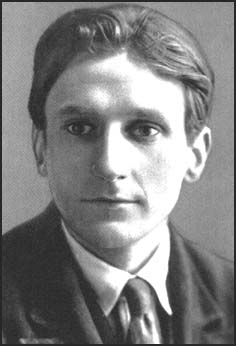
Undertones of War, the book that Helen Kemp picked up––Edmund Blunden’s autobiography of his traumatic WWI experience––has recently been reissued by the University of Chicago Press. It includes a selection of Blunden’s war poems. Readers of Ward McBurney’s terrific poem might be interested in two letters to Frye from Blunden, spurred by Frye’s having sent his Oxford tutor a copy of Fearful Symmetry. During his second year at Oxford, Frye had been urged by Blunden to postpone the writing of his Blake thesis and concentrate on the “schools” – the examinations for his degree.
c/o Times, Printing House Square, London, E.C.4.
6 Novr. 1947. With great pleasure I received the book this morning, and with perplexity––for I leave today with family for Japan and am in the same old Christmas tree condition as when once in the Elder War we were about to move . . . . I think that I will have the book kept safely for my return when I can sit down to it with the necessary library in reach and then I’ll write you a proper letter of thanks. You will know I still recall vividly yr. devotion to Blake at Oxford and I rejoice in the spectacle of such constancy of imaginative endeavour––in these days of rapid zests and desertions. We all read Miss Sitwell’s first eloquent appreciation of the Blake [Edith Sitwell, “William Blake,” Spectator 179 (10 October 1947): 466] which must have been a most welcome press cutting. I’ve been away from T.L.S. latterly but know that a review is in hand there. [“Elucidation of Blake” by an anonymous reviewer appeared in TLS, 10 January 1948: 25] Hope you are well and merry. Merton is unchanged in much, but men come & go: you will have heard that H.W. Garrod, who seems the exception, has had his portrait done by R. Moynihan for the panelled room where you attended Collections. It’s a speaking likeness, & a work of art. [Garrod, a classics scholar, was a fellow at Merton College for more than sixty years.] Every good wish, & thanks indeed. EBlunden.
Two months later, Blunden wrote again:
U.K. Liaison Mission, British Embassy, Tokyo, 31 Jan. 1948
My dear Norrie,
About the time when Miss Sitwell was giving your Blake the right send off in England and while a review was in gestation for the Times Lit. Supp. I was hurriedly getting my bits and pieces in order (and it is a job to get anything done even slowly in England lately) for my appointment here. I do not know whether I shall be able to receive the copy you so handsomely sent for me before my return to England & that may be a year away; but probably another copy will be coming out here among new books acquired for Tokyo needs, and I look forward to sitting with your final interpretations in that copy. W.B. has a way of reaching Japan also. May you be receiving lots of interesting appreciations of this long matured essay.
Observe that my escape from teaching was a fantasy! For I am lecturing and chattering and scrawling away in that service almost more than ever. The Foreign Office thought that someone from England should come out to help in the revival of studies in Japan & the Supreme Commander approved. This venture appears to be well liked by the Japanese, but I have the personal advantage of finding many old friends still alive and some of them eminent in the university world here. [Blunden had been a professor of English at the University of Tokyo, 1924–27.] Moreover I have a small daughter who is impudence aged 2 and I am wicked enough to let her do some charming.
Jack Garrett like yourself remains part of my Merton for my time. [Garrett was a Rhodes scholar from Alberta, who studied at Merton College, 1937–40; he taught at the University of Alberta, the University of Toronto, and Canterbury College in New Zealand.] You heard that we lost poor Deane Jones [fellow of Merton College from 1921 until his death in 1947] with frightful suddenness. He drove himself with a sort of religious intensity. Garrod’s letter to me just received is a proof that Fellows Quad stands, and that a steady flow of irony and double negatives is available there.
I must break off––Guests for supper, conversation will include Blake, and Oxford.
Best thanks and wishes
Yours ever
EBlunden

Some further annotation might be useful: the relationship between Blunden and Frye warmed in later years but was initially a difficult one, at least from Frye’s point of view. He expressed contempt for Blunden’s scholarship, finding it typical of the English approach to criticism and teaching at Oxford: “niggling”, distracted by minutiae, and obtuse to any wider vision. Blunden appears to have been obtuse, too, to Frye’s genius as a critic–hard to forgive when you’re the junior party and hungry for affirmation.
Frye was also disturbed by Blunden’s apparent approval of the Nazi experiment in Germany–an infatuation with fascism not atypical of a certain sector of the intelligentsia in England at the time. The same thing cropped up when Frye met with Jackson Knight, the classicist, with whom he otherwise felt a “mythological” affinity.
An infatuation not atypical of many who went through darkness visible only to see their defeated other apparently rising from the ashes of 1919.
I’m wondering, too, if any of the visitors to this fine, new blog have read Blunden’s book and how much of a call there is for an informal review of it on my part. For me, it is, as T.E. Lawrence said of Frederick Manning’s Her Privates We, “the book of books” so far as the English experience of the Great War is concerned.